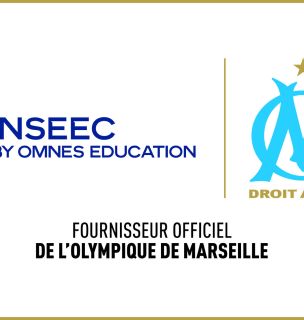The Financial Analyst must follow the changes in the markets
programme director
The MSc International Financial Analysis programme
The educational content of the programme is designed to provide participants with the technical and professional skills necessary to practice financial analysis. An analyst is eager to collect and interpret the company’s data. For this reason, financial analysts are in great demand, whether they specialise in a particular sector of activity or a geographical area.
The students follow a technical training aimed at giving them the mastery of the collection and analysis of financial, social and economic data of the markets in which they will be specialized. They are trained to work mainly in banks or investment companies.

A 1 or 2 year degree to become an expert in Financial Analysis
- Hourly volume 1st year of MSc: 441 hours
- Hourly volume 2nd year of MSc: 441 hours
Objectives of the programme
The objective of this program is to enable learners to acquire high-level expertise in the field of corporate finance in general and financial analysis in particular. The program is based on an in-depth study of financial, accounting and legal techniques allowing them to acquire solid knowledge essential for high-level professions. The objectives in terms of skills are to be able to:
- Analyze strategic company data
- Control and manage the company’s activity
- Ensuring the sustainability of the company’s activity
- Issue financial recommendations and master communication
How to apply for the MSc in International Financial Analysis at INSEEC?
The required prerequisites
The conditions for accessing the certification system (excluding VAE) are:
- For entry into the 1st year of the course (MSc 1): to have validated 180 ECTS (level 6, License or equivalent) in the field of marketing, commerce, management or communication. The student must have a professional level of English for the English-speaking program.
- For entry into the 2nd year of the course (MSc 2): to have validated 240 ECTS (level 6, Master 1 or equivalent) in the field of marketing. The student must have a professional level of English for the English-speaking program.
- Executive training is subject to specific prerequisites with professional experience taken into account.
Want to know more about the MSc in International Financial Analysis?
Sign up for an Open Day!
Would you like to know more about the admission conditions for our programme in MSc in International Financial Analysis?
Courses
The courses presented below are given as an example, they may vary slightly depending on the teaching campus. The course content is adapted each year to market developments and updated before the start of each new school year.
1st year courses
CROSS-DISCIPLINARY & FUNDAMENTAL COURSES – 1ST YEAR
BUDGET MANAGEMENT AND DASHBOARD
The objective is to acquire key skills in budget management and reporting. Particular emphasis will be placed on budget architecture, including the implementation of summary documents, project management control and its connection with budget management, as well as the creation and monitoring of dashboards.
CORPORATE STRATEGY AND BUSINESS PLAN
This module aims to teach the creation of a Business Plan: designing a financial project for starting or expanding a business. Several key steps are covered :
- Feasibility study
- Market targeting
- Opportunities and risks
- Strengths and weaknesses
- Communication
- Financial planning and profitability
ETHICS AND PROFESSIONAL STANDARDS
- Cover the fundamental principles of ethics and professional conduct in the field of financial analysis and asset management.
- It aims to ensure responsible professional behavior, in compliance with established international standards.
DECISION SUPPORT SOFTWARE AND TOOLS
The objective of this module is to deepen students’ IT skills to meet the needs of companies in areas such as budget or sales tracking, project management, personnel management, and communication: Excel, Word, PowerPoint, teamwork tools, and industry-specific software. It aims to develop proficiency in office tools, quickly identify and correct errors, customize existing tools, or create one’s own tools.
BUSINESS GAME
- The business game is conducted using a management simulator.
- Groups of students are responsible for managing a company in real-time.
- All major functions of the company are addressed.
- Students will make decisions aimed at maximizing the company’s profitability.
PROFESSIONAL TOOLS AND METHODS
This module allows learners to enhance their CV and professional presence through various practical exercises (professional simulations, public speaking, etc.) :
- Practical and professional workshops (CV, professional social networks, coaching, etc.)
- As well as career conferences and master classes.
SPECIALIZED COURSES
MERGERS AND ACQUISITIONS #1
- Understand the processes of strategies and financial implications of mergers and acquisitions.
- It covers the key aspects of valuation, structuring, and negotiation of transactions, as well as their effects on the value of the companies involved.
FIXED INCOME #1
- Covers the analysis and management of fixed-income instruments, such as bonds and other debt securities. It explores the characteristics, valuation, and risks associated with these instruments, as well as their role in portfolio management and monetary policy.
MANAGEMENT CONTROL
- Break-even point calculation and dead point analysis
- Budget management techniques
- Activity monitoring and dashboards
- Analysis and application of management control
- Cost calculation methods
- Analysis center methods
- Rational allocation of fixed costs
- Marginal cost
- Partial costs
INTERNAL AUDIT
- Evaluation of operations and the company’s level of control.
- Providing advice and studying tools to contribute to value creation.
- Evolution of the auditor’s profession.
STATUTORY AUDIT
- The seminar covers financial audit assignments, including procedures, tests, methods, and audit tools.
- It presents statutory auditing, general aspects, and audit implementation, assessment of internal control, specific verifications, and final mission reports.
- Analytical procedures, physical controls, and management representations are also addressed.
FINANCIAL STATEMENT ANALYSIS #1
- In-depth analysis of a company’s financial statements to assess its performance, profitability, and financial stability.
- It enables the interpretation of accounting and financial data to make informed investment or financing decisions.
DERIVATIVE AND ALTERNATIVE INVESTMENTS #1
- Covers derivative financial instruments and alternative asset classes used to diversify and optimize investment portfolios.
- It explores their functioning, valuation, and role in risk and return management.
BUSINESS LAW
- Definition of business law.
- The concept of contracts.
- Obligations of means and results.
- The concept of legal personality, the functioning of SARL, SA, and SNC.
- Criteria for choosing a business structure.
INTERNATIONAL FINANCIAL STATEMENTS
- Presentation of the IFRS and US GAAP frameworks.
- Comparison of financial flows over time.
- Organization of the accounting framework, conceptual framework of standards, and presentation of financial statements under IFRS/US GAAP.
- Valuation and accounting of financial instruments.
CORPORATE FINANCE AND EQUITY INVESTMENT #1
- Investment projects: selection criteria and the real options approach.
- Financing methods: quasi-equity, bond financing, negotiable debt securities, IPOs, venture capital.
- Theoretical explanations of financing choices.
- Cash management and centralized flow management.
PORTFOLIO MANAGEMENT AND ECONOMICS #1
- The principles and scope of corporate tax (IS), tax optimization within a group.
- International taxation.
- VAT: principles and mechanisms.
- Special VAT regimes.
- VAT territoriality: rules of VAT territoriality, supply of movable goods, service provision.
- VAT liability: VAT base and its calculation.
E AMF
This hybrid-delivered module will provide an understanding of the role of the Financial Markets Authority in regulating and supervising financial markets through the following topics :
- Financial instruments, crypto-assets, and risks.
- Collective investment management.
- Market organization and functioning.
- Post-trade and market infrastructures.
- Securities issuance and corporate actions.
- Accounting and financial fundamentals.
QUANTITATIVE METHODES #1
- Mathematical and statistical tools applied to financial analysis, risk modeling, and investment decision-making.
- It enables the use of financial data to assess asset performance, measure risks, and optimize investment strategies.
TECHAWAY – START WITH PYTHON
- Introduces the use of the Python programming language for financial analysis, data management, and process automation.
- It helps develop skills in data science applied to finance by utilizing specific libraries.
EXAMS & SUPPORT
WRITTEN EXAMS
2nd year courses
FINANCIAL & NON-FINANCIAL STRATEGY
FINANCIAL STATEMENT ANALYSIS #2
- In-depth analysis of a company’s financial statements to assess its performance, profitability, and financial stability.
- It enables the interpretation of accounting and financial data to make informed investment or financing decisions.
FIXED INCOME #2
- Covers the analysis and management of fixed-income instruments, such as bonds and other debt securities.
- It explores the characteristics, valuation, and risks associated with these instruments, as well as their role in portfolio management and monetary policy.
ESG INVESTING
- Integration of Environmental, Social, and Governance (ESG) criteria into investment strategies.
- It enables the analysis of how these factors influence the financial performance and risks of companies, and how they are considered by institutional investors and asset managers.
INTERNATIONAL FINANCIAL REPORTING STANDARDS
- The conceptual framework. Presentation of financial statements.
- The content of key standards.
- The concepts of financial position and financial performance.
- Intangible assets and business combinations.
- The importance of cash flows.
- Impairment tests.
- Financial instruments and the treatment of derivatives under IFRS.
FINANCIAL PERFORMANCE
COMPANY VALUATION & LBO
- Asset-based and goodwill-based methods. DCF-based methods.
- Analogous methods.
- From value to price, internal and external factors to the parties involved in the transaction and transfer.
- Study of the fiscal, financial, and social constraints of a transfer.
- LBO (Leveraged Buyout) transactions.
- Establishment of holdings and their impact on cash flow.
- Leveraged financial structuring.
- Governance of companies under LBO.
FORECASTING MANAGEMENT, CASH MANAGEMENT AND EXCHANGE AND CURRENCY RISK
- Budgeting and centralization of intra-group treasury operations.
- Cash management investments and financing.
- The use of derivative products for hedging interest rate and exchange rate risks.
PORTFOLIO MANAGEMENT AND ECONOMICS #2
- Portfolio management strategy, asset allocation optimization, and investment performance evaluation.
- Maximizing risk-adjusted returns based on the objectives and constraints of investors.
REGULATION AND COMPLIANCE
- Understanding the financial regulations and compliance obligations that govern financial markets and financial institutions.
- Analyzing the impact of regulations on risk management, transparency, and the stability of the financial system.
FINANCIAL ENGINEERING
CAPITAL RESTRUCTURING
- Complex financial structures designed to meet the financing needs of large companies and projects through bond issuances, securitization, mezzanine financing, and syndicated loans.
- The focus is on risk management, tailored structuring, and optimizing financing costs.
- The challenges of bank and bond debt. Public offers (tender offers, exchange offers, etc.) and IPOs.
MERGERS AND ACQUISITIONS #2
- Understanding the processes of strategies and financial implications of mergers and acquisitions.
- It covers the key aspects of valuation, structuring, and negotiation of transactions, as well as their effects on the value of the companies involved.
TOOLS AND PROFESSIONAL METHODS
This module helps learners improve their CV and professional presence through various exercises (professional simulations, public speaking, etc.); practical and career-oriented workshops (CV, professional social networks, coaching, etc.), as well as career conferences and master classes.
MANAGEMENT OF ORGANIZATIONS & TEAMS
EXCEL, VBA
- Organize data from multiple sources in different formats to build clear dashboards.
- Automate data collection to reduce decision-making time and minimize errors due to re-entry.
- Present data and enhance the visual communication of information.
TEAM & TALENT MANAGEMENT
From recruitment to training, including the implementation of an attractive compensation policy, processes, procedures, and indicators to be set up to ensure effective management of employees and their roles within the company.
TRANSFORMATION AND CHANGE MANAGEMENT
- Understand the strategies to support financial developments within organizations, such as managing restructurings, integrating new financial tools, and ensuring compliance with regulations.
- The focus is on communication, training, and managing stakeholder resistance.
- The goal is to ensure a smooth transition to optimized and sustainable financial practices.
TECHAWAY – DATA PROCESSING & GENAI
- Deepen advanced data analysis using Python and harness the potential of Generative Artificial Intelligence (GenAI).
- Learn how AI techniques can enhance data interpretation and communication through prompt engineering.
- Apply data processing strategies to real-world cases.
- Develop a critical mindset essential for advancing in the field of data.
FINANCIAL RISKS & CREDIT RISKS
RISK MANAGEMENT
- Explores the principles of credit risk management in financial institutions and businesses.
- It covers creditworthiness assessment, credit ratings, financial analysis, and scoring models.
- The focus is on identifying, measuring, and managing default risks, as well as understanding regulatory frameworks (Basel Accords).
QUANTITATIVE METHODES #2
- Mathematical and statistical tools applied to financial analysis, risk modeling, and investment decision-making. It enables the use of financial data to assess asset performance, measure risks, and optimize investment strategies.
ADVANCED AND ALTERNATIVE INVESTMENT
- Deepen the use of complex derivative instruments and the analysis of alternative asset classes.
- This allows for exploring advanced strategies in hedging, arbitrage, and speculation, as well as optimizing alternative investment portfolios.
APPLIED MASTER THESIS
- Enable learners to understand the requirements of an applied research thesis.
- Formulate a research question, build a literature review, choose the study methodology, and make recommendations.
EXAMS & SUPPORT
WRITTEN EXAMS
THESIS DEFENSE
2 start dates per year and various study formats
There are two openings per year, in February/March and September/October. To check the enrolment availability, contact the admissions department directly.
The pace of the courses may differ depending on the campus and whether the training is carried out under an internship agreement (full-time study) or a professionalization/apprenticeship contract (continuing education).
The work-study contract must be signed for a period of 12 months (MSc 2), 24 months (MSc1 + MSc 2) or 18 months for the staggered start in March (continuation of studies in MSc2).

Career opportunities after an MSc in International Financial Analysis
- Credit Analyst
- Asset Manager
- Financial Analyst
- Fund Manager
- Financial Expert
- Investment Advisor
- Expert in Risk Management
- Head of Financial Communication
- Compliance Manager
- Financial Management
What business skills are developed?
The objectives in terms of skills are to be able to:
- Analyze strategic company data
- Direct and monitor the company’s activity
- Ensure the sustainability of the company’s activity
- Make financial recommendations and mastering communication
Description of the methods for acquiring certification by capitalisation of skill blocks and/or by correspondence
Certification is obtained by:
- Validation of four skill blocks common to all courses (obtaining a score greater than or equal to 10/20 for each skill block)
- Completion of an end-of-studies dissertation with a grade greater than or equal to 10/20
- Completing a period in a company of at least 132 days in the second year of the course (MSc 2)
Professional certification of “Expert in Financial Strategy” at level 7 (EU), NSF codes 313 and 314, awarded by INSEEC MSc (CEE-SO, CEE-RA, CEFAS, CEE-M, CEE-OUEST, MBA INSTITUTE, ADEFI FORMATION), registered under number 40177 in the RNCP (National Directory of Professional Certifications) as decided by the Director-General of France Compétences on January 31, 2025.
Certification is delivered by capitalization of all skill blocks. Each skill in a block must be confirmed to obtain the skill block. Partial validation of a block is not possible. It is also accessible through the Validation of Acquired Experience.
Find the skill blocks associated with this RNCP title by clicking here.
What are the teaching methods?
Teaching methods
- Lectures or/and interactive courses
- Situational exercises through collective or/and individual case studies carried out by the students
- Conferences, seminars or/and educational visits
Evaluation methods
- Individual or/and group case studies
- Individual or/and group oral presentations
- Individual or/and group files
- Applied research dissertation for individual defense
Methods and tools
- The evaluation methods are in person, in the form of continuous assessment or final written exams.
What is the 2025/2026 tuition to enter the programme?
SPRING INTAKE – 2025
Initial training:
- MSc1 : €11,400
- MSc2 : €12,950
Continuing education (sandwich course) :
- 24 months : €22,850 before tax
- MSc2 : €13,650 before tax
International students pack
Mandatory fee of €490 for exclusive support services for international students living outside the European Union.
FALL INTAKE – 2025
Initial training:
- MSc1 : €11,850
- MSc2 : €13,500
Continuing education (sandwich course) :
- 24 months : € 23,850 before tax
- MSc2 : € 14,250 before tax
International students pack
Mandatory fee of €700 for exclusive support services for international students living outside the European Union.
VAE/VAP
- VAE: €4,800 before tax
- VAP: €850 before tax
International students pack
Mandatory fee for exclusive support services for international students living outside the European Union.
- Spring intake (2025) – February/March: €490
- Fall intake (2025) – September/October: €700
Application fee
The application fee is €80.
What kind of financial aid is available?
INSEEC offers several financial aid schemes:
- The alternating rhythm, in internship or work-study contracts
- The right to training via the CPF
- Partnerships with banking institutions listed at INSEEC
KEY FIGURES FOR THE RNCP TITLE No. 35007 "EXPERT IN FINANCIAL ANALYSIS"
92%
National success rate – Class of 2023
97%
Presentation rate – Class of 2023
86%
Overall employment rate (140 respondents out of 368) – Class of 2022
78%
Satisfaction rate at 6 months – Class of 2022
Disabilities
The OMNES Education Group pays particular attention to the societal environment, including the disability dimension. Indeed, we believe that students with disabilities should not have any problems in pursuing their studies and starting a professional career. We accompany them to facilitate their access to the premises, offer them personalized advice as well as adapted accommodations throughout their school career.
Accessibility of premises: all our campuses are accessible to people with disabilities.
To learn more about INSEEC’s disability policy, click here.
Contacts for disability referents by campus:
- Bordeaux : Maxime DOUENS – mdouens@inseec.com
- Lyon : Anissa GASMI – agasmi@inseec.com
- Rennes : Laura LE CALVEZ – llecalvez@omneseducation.com
- Paris : Farid HAMAD – fhamad@inseec.com
- Chambéry : Clément BERTACCO – cbertacco@inseec.com
- Marseille : Océane VALOTTI – ovalotti@omneseducation.com
- Toulouse : Amanda MARNEIX – amarneix@omneseducation.com
News

June 2024
INSEEC hosted the CFNews Grands Prix de la Croissance Externe Sud Ouest for the second year running
Read more





